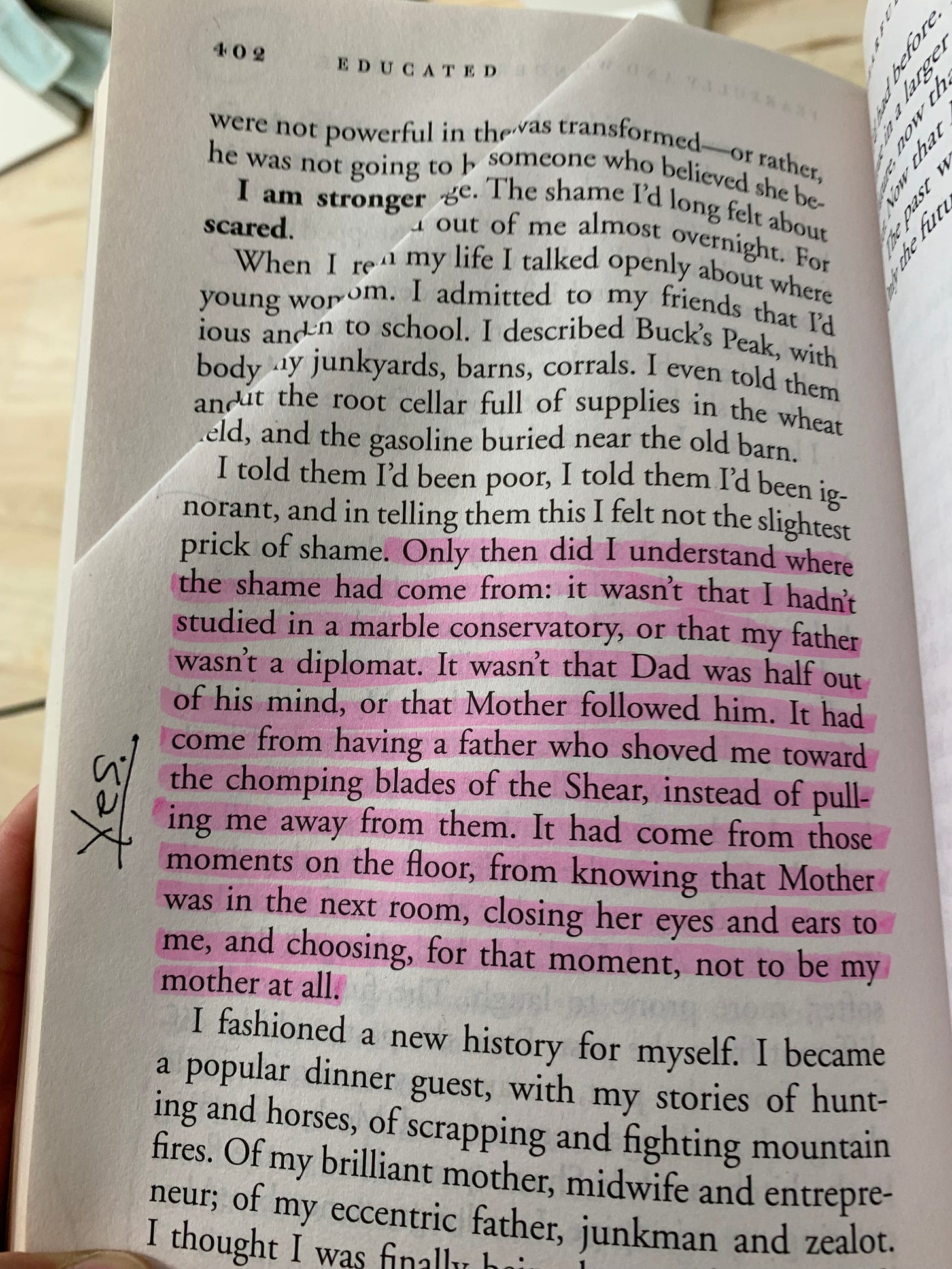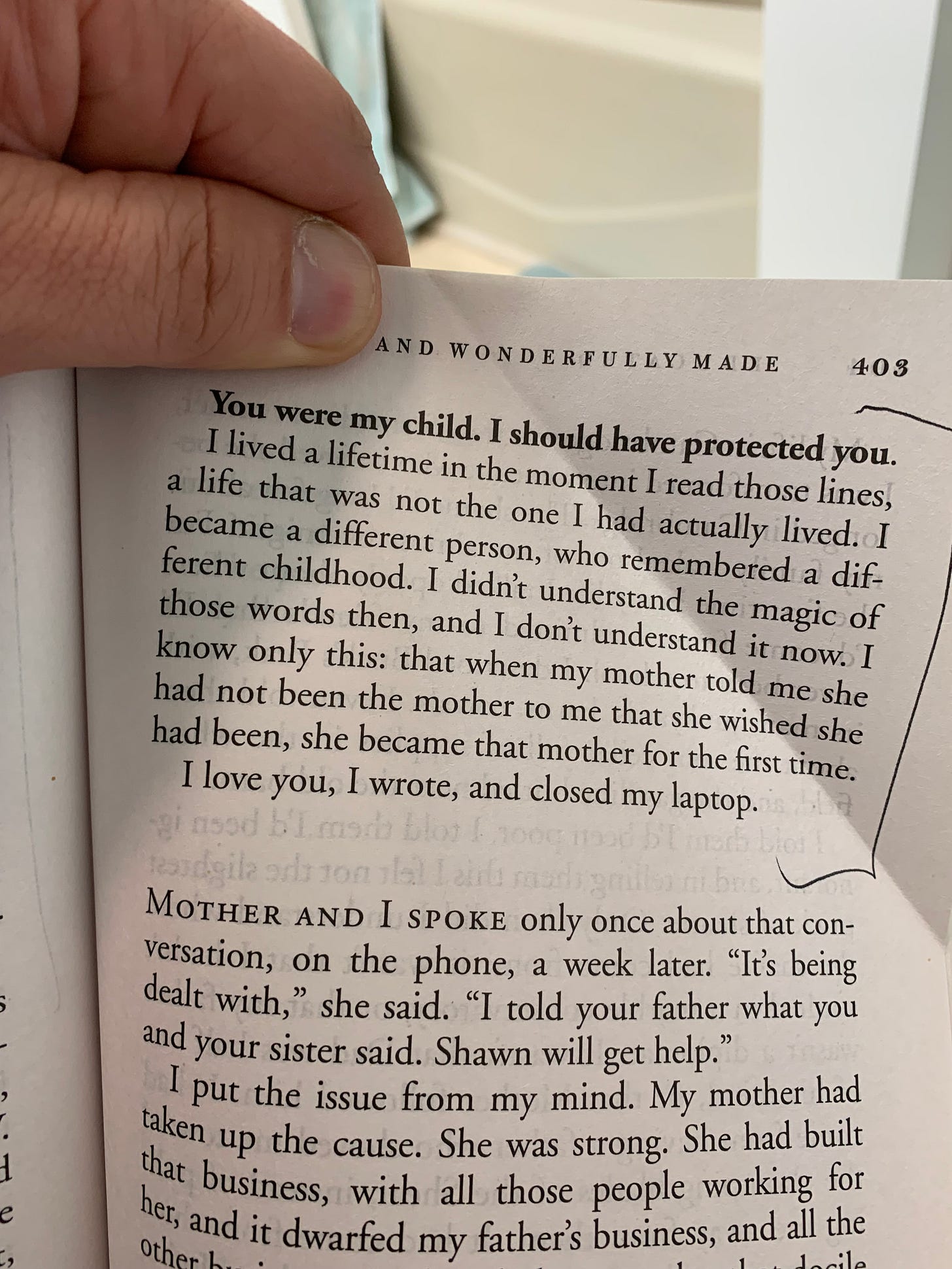
*Please consider:
1. Subscribing if you haven’t yet (this story is paywalled…most are free)
Sharing this post (if you like the story)
“Recommending” “Sincere American Writing” on your Substack page.
Thank you for reading, everyone!!!
###

A Review of the Memoir “Educated”
Educated, for those of you who don’t know, is a 2018 memoir by Tara Westover. It created a huge splash in publishing when it first came out. In 2019—when I was living in Manhattan—I remember walking into Shakespeare & Co on Broadway between 69th and 70th in the Upper West Side and seeing it on the shelf, shiny and beaming at me with almost sinister pride. I plucked the book from the shelf (hardback) and read the flap. Tempted as I was, the free-thinking, contrarian child inside refused to read a trendy New York Times bestselling book that everyone and their mother was yapping about incessantly. I was “too cool” perhaps.
Fast forward to 2022. One week ago, to be precise. (The end of the first week of November.) A fellow writer on Substack (who mysteriously seems to have disappeared and I can’t recall his name!) published a post about the book. His take on it was fascinating, and came from an almost exclusively class-based perspective. (Being a “first-generation” college student in his family.) Reading his post at last inspired me to read the book. I jumped on Amazon to order the book when I paused, realizing my [author] mom had already sent me a copy. It had sat in a corner of first my apartment in East Harlem, then in Lenox Hill, and now in Santa Barbara.
Educated is basically about Tara’s experience growing up in a survivalist family in a rural mountain area of Idaho. Her father was bipolar (they didn’t know this until she was in her twenties) and believed the government was evil and that education was “socialist.” Tara’s mother became a regionally-well-known herbalist and tincture-user as well as a natural midwife who regularly delivered babies around the area. Tara and her siblings (mostly older brothers) were prevented from going to school for many years, and they spent many hours preparing for “the apocalypse.” Mom and Dad were devout Mormons.
One could say the story, on the surface, is about Tara’s escape from this rugged rural landscape, away from her toxic father and older brother Shawn (who often physically abused her) and towards the waiting arms of academia (she eventually achieved a PhD), writing, healthy relationships, The World. And this is true. On the surface. But deeper down this is really a story about self-identity, about how one woman grew up in a sexist, patriarchal world wherein she was supposed to serve the men in her tribe. It’s about surviving familial domestic violence. It’s about one woman’s struggle with both nature and nurture, her genetics and her class and her environment, and how she finally broke free from those tainted chains. It’s the story of learning how to love oneself; learning how to accept Life on Life’s Terms; learning how to let go; learning how to love.
Westover writes painfully clearly about being gaslit by her family, about the stink and rot of all the things which never got spoken aloud, the nasty secrets within the family which were all supposed to stay shoved under the rug. The lies her parents told themselves about their daughter’s abuse at the hands of their oldest son. What wasn’t convenient for her parents they simply ignored. When reality became uncomfortable, they simply altered reality. (Sound familiar? Politics and cultural discussion in 2022?)
Following her journey from barefoot, dirty, indoctrinated wild-girl in mountainous Idaho to fresh, awkward, overly pious and self-righteous cash-strapped college kid was fascinating, without a doubt. And yet that wasn’t what interested me most. What interested me most was her denial, her self-destructive tendencies, her constant rationalization around her family’s lies and abuse, her need to tell herself a compelling story, even when that story had crumpled all around her. She couldn’t date men for long because her self-worth was so abysmally low. She never thought she was good enough for college, let alone Cambridge and Harvard. No matter how hard she tried to convince herself to detach from her unhealthy family, she simply could not do it. She belonged, in the end, to her father. Psychologically speaking.
I think the strongest aspect of Educated was the profound story and character ARC. In other words: The movement from A to Z. From wild-child in a fundamentalist Mormon clan to sophisticated, stylish PhD Harvard grad. I felt Westover did a very solid job of slowing peeling away the layers of the psychological onion, piece by slow piece pulling back the curtain and showing us her deep internal struggle. Showing us the bleak and lurid details made the story, and Tara as a “protagonist” feel extremely authentic and, more crucial, relatable. To varying degrees we’ve all been in Tara’s shoes, if not on a much more lightweight level. Who hasn’t felt stranded as a kid or teen, feeling like they don’t fit in, desperately wanting to escape from the familiar and leap into The New? I know I had that feeling. And we do grasp these new revelations and insights slowly, bit by bit, sometimes in minor cracks of understanding, other times in great leaps of Truth.
And this was the aspect that hit me the hardest on a personal level. She and I come from vastly divergent perspectives and realities: I was born and raised by two loving, caring, if not perfect parents, with plenty of money and stability. I went to private college-prep high school after K-8 private Episcopalian school. And yet, there was some instability, some darkness within the perceived external light. This led me (along with genetics) to alcoholism, which, for a dastardly decade, took me to depths of depravity I now cannot fathom. Perhaps on some level Tara’s story and my story are two sides of opposing coins. (This doesn’t line up precisely. But somewhat.)
I, too, felt low self-esteem as a kid. I, too, felt I never fit in. I, too, was a loner, a confused, weird kid who seemed to march to the rhythm of his own chorus. I, too, rejected my parents as a teenager, and rejected the middleclass world they’d created for me. In my case that meant rejecting safety, warmth, money, capitalism, the 9-5 work life, the sort of Boomer Leave-it-to-Beaver pantomime.
I fled safety and waltzed carelessly into absurdity, anarchy, darkness, the void. Tara, on the other hand, started in unsafety, fear, worry, terror, and shifted slowly into the light of what I escaped. Irony is a funny phenomenon. My girlfriend and I were recently discussing this strange notion: Those born with money often wish (as I did) for the working-class experience; those born without money often wish for the wealthy experience. Being born wealthy and desiring a more working-class reality seems bizarre and paradoxical to many, but this is nevertheless the case for many a rich kid as I was.
In the end I see that Tara had a great, profound and urgent need to sever her metaphorical umbilical cord from her family. She loved them, and they loved her, but ultimately their love was conditional. She was expected to keep secrets, tell lies, deny her own true experience, pretend reality had not occurred. She changed from immature test-tube kid to mature, educated woman. Ultimately it was education—both formal but also in terms of free lived life experience, new friendships out in the “real world,” broken romantic flings, travel—that saved her life, that metamorphosed her from pupae to butterfly, flying away into the universe.
This, I relate to the most. I had twelve years of formal education, all in private schools with high standards. Then I attended seven colleges over an 11-year period which I completed with a bachelor’s degree in writing from San Francisco State in 2013 at age 30. (The drinking got in the way, which is why it took me so damn long.) Those years of traditional, formal learning were helpful, no question. But that wasn’t what I consider to be my real, true education. That’s not what made me who I am, or what made me a writer. I landed where I am by gaining serious, gritty life experience.
From becoming an alcoholic and surviving it. From hitchhiking across and all over the United States for years on and off. From trips to Europe. Solo backpacking adventures for days at a time. Fist-fights. Women. Moving constantly for years, sometimes three or more times in one 12-month period. (In 2008 alone I moved five times.) And, yes, from my own personal reading. The classics. Kerouac, absolutely, but also Henry Miller and Rousseau and Orwell and Steinbeck and Sontag and Mailer and Hemingway and Coates and Baldwin and [Zadie] Smith and Salinger, etc.
I understand Tara’s life experience, going from one thing to another and the gap between these two things being so deep, so vast that it seems only possible for two separate beings to accomplish. And yet it wasn’t two separate beings, for Westover or for myself. It was us, one united human entity perhaps spiritually fragmented into a hundred different refracted lights, beaming back on ourselves. Some of us take an incredible amount of suffering to arrive back at ourselves. Tara did. I certainly did, too.
Either way, Educated is one of the most potent contemporary memoirs I’ve read in a long while.
I look forward to more work from Tara. This was her debut. A lifetime of “education” led her to this powerful literary offering. We thank her for the gift.
###
Michael Mohr





